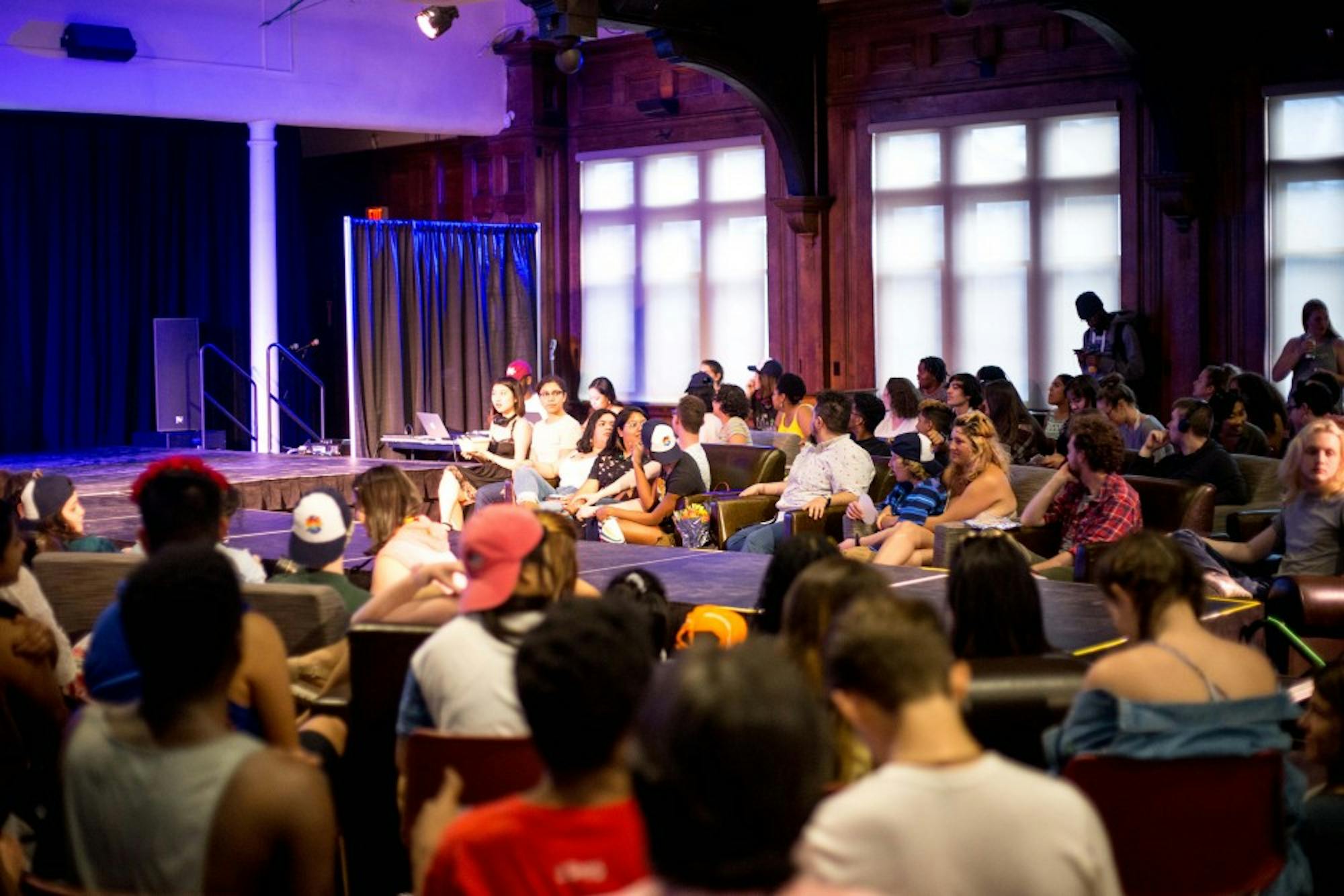A disembodied voice purred across the empty stage and runway, “You can’t see me, just hear me and know everything is beautiful.” Thus began Transform, a talent and fashion show put on in honor of Pride Week. Everything was indeed “beautiful” as an impressive array of student talent and spirit electrified the stage throughout the night.
According to director Danica Rodriguez ’18, the show began as a way to provide visibility to people who didn’t fit the gender binary. Since then, it has become a forum for people to explore how to express themselves through gender.
“It’s open to anyone who’s willing to go on this personal journey and talk about gender and talk about how they interact with it, the barriers that come with the binary, and how we can fight that and fight cis-heterosexism, which is pretty prevalent on this campus,” Rodriguez said.
The emcee for the night was Rhiannon Nichelle, a drag queen who has competed in and won prominent drag competitions in New York. Interspersed throughout student performances, Rhiannon Nichelle — who refers to herself as RhiRhi — performed some of her professional numbers. Some of the highlights included a set to a mix of Taylor Swift’s “Look What You Made Me do” and a snarky spoof of Katy Perry’s “Firework” which is edited so that the only lyrics in the song are, “Do you ever feel like a plastic bag?”
Throughout the two-hour show, each student that came on stage represented the voices and visages of people on the margins of public dialogue. The student runway show bookended the night — each model showcased their own unique identity with their background music, clothes and strut. Models ranged from seasoned drag performers to students who had never set foot on a runway, and each walk boldly asserted beauty, empowerment and pride.
For Rodriguez, Transform was an expression of love, first and foremost for the cast, but also for the people who came to see them.
“I wanted the audience to feel just as much love as the cast,” she said. “I want them in this moment to be open and free and loud if they want to be, or quiet if they want to be, and just kind of have like an elated, beautiful moment — even if it was ephemeral.”
The talent show portion of Transform included performances of spoken word poetry. Both performers eloquently engaged with topics including sexuality, race, culture and gender and commanded both presence and power. The poets defiantly rejected oppressive cultural norms, speaking out against topics such as entitled and violent masculinity and queer inclusion in language.
The Rockapellas also gave a powerful performance, singing a set that highlighted both their vocal prowess and themes of empowerment and self-love. Songs performed included “Pretty Hurts” by Beyoncé and “Is Your Love Big Enough?” by Lianne La Havas. Also performed were pop pride anthems “Same Love” by Macklemore and “Born This Way” by Lady Gaga.
Later in the show, students also showcased their dancing and lip-syncing performances. Dance troupe Prism electrified the stage with two sultry numbers. Toward the end of the night, the non-competitive and competitive lip-syncing portions showcased bold style and vibrant performance.
“I wanted to branch out, try new things and just have a fun time and to build confidence and self-esteem,” said Nicholas Woo ’20, a runway model and lip-sync participant.
For many, the show was a moment of release — and Rodriguez says it was meant that way.
“A lot of things that we talk about like in Pride and speeches and keynotes can be a little heavy and it should be heavy,” she said. “There are important topics that need to be discussed and heard on this campus. But I think the queer community deserves a moment just to be happy and themselves and just have a really raw and fun time.”
For many queer people on campus, Rodriguez said, Dartmouth is the safest place they’ve experienced to get to know people and find connection. That’s not necessarily due to institutional support, according to Rodriguez, but rather a result of students supporting one another. Numerous student groups have rallied around marginalized groups. Rodriguez cited Tabard gender-inclusive fraternity and Epsilon Kappa Theta sorority as examples of places that have done their part to support such groups.
However, Rodriguez is still looking for signs that Dartmouth as an institution supports queer people. Steps such as the financial backing of queer groups, the preservation of spaces for marginalized groups on campus or even an appearance by College President Phil Hanlon at Pride events such as Transform would make a bold statement on the part of the institution.
This show was an integral part of the broader vision of Pride Week. For Woo, strutting down the runway and performing his lip sync number meant increasing the visibility of queer people of color on campus.
“By performing, I can be just one more person to look to and be able to say, “Maybe I can express myself too,” he said.
Rodriguez situated her role in facilitating Transform within the longer term goal of fostering acceptance of the queer community at Dartmouth.
“I want in thirty years for a queer student to be able to walk this campus and wear what they want to wear, say whatever they want and just feel completely at ease,” she said.
Transform was a unique display of the beauty, power and individuality of the queer community at Dartmouth. Rodriguez, the cast and everyone who helped to make Transform a success certainly did their part in helping to realize that future.




